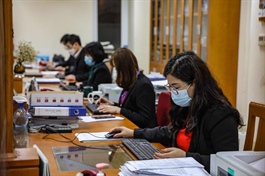Non-traditional approaches to monetary polices
Non-traditional approaches to monetary polices
Exchange rates and interest rates are being handled in a satisfactory manner, according to Dr. Truong Van Phuoc, a member of the Prime Minister’s Economic Advisory Group and former acting chairman of the National Financial Supervisory Commission. He talked to VIR’s Hong Dung about the State Bank of Vietnam’s recent moves on interest rates and exchange rates.
What are the impacts of the recent expansion of the exchange rate band and what are some problems this may cause in the macroeconomic structure?
In an integrated world, the exchange rate is not calculated bilaterally but depends on the weight of Vietnam’s economy with other countries.
When evaluating a currency, we need to look at the exchange rate mechanism of a selected country. In some countries, the currency is fixed. In developed countries, the currency is “floated”, determined by supply and demand. Vietnam chooses the floating mechanism but with management and regulation. The State Bank of Vietnam (SBV) announces the central exchange rate and the market operates around the rate within a margin.
Regardless of the central exchange rate, the regulated margin is to ensure that the Vietnamese economy achieves the optimal state, including trade balance and the market’s attractiveness to investors. The SBV’s move to widen the exchange rate band is meant to create opportunities for different parties in the market to choose the best spot to meet.
There is no policy that is absolutely right everywhere, at all times. The question is, with the current central exchange rate, has the market reached the top of the 5 per cent range? If it does, the SBV needs to pay attention because the exchange rate is an input variable for many other variables. Depending on specific conditions, the SBV will have its own countermeasures.
What is your advice when the exchange rates go up?
The exchange rate involves two currencies, each has factors attached to its benefits such as interest rate and exchange rate correlations, trend forecasts, and fluctuating interest rates. Its import and export are the business responsibility to respond accordingly. In addition, there are financial services provided by the banking system to advise market members. And above all, it’s the SBV’s task to create policies that stabilise the market.
It is estimated that since the beginning of the year, the VND has depreciated by approximately 7 per cent, which has created competitive advantages in exports. VND appreciated against Euro and Japanese Yen, but import and export are all priced in USD.
Therefore, Vietnamese exporters to other markets outside of the United States still benefit. This is clearly shown in Vietnam’s trade surplus.
On the side of importers, there are losses. But in general, a policy where everyone is happy is impossible. We must accept that one party benefits and the other suffers. But overall, we’re still seeing inflation as low as 3 per cent.
Some forecasts say Vietnam will suffer from higher inflation in 2023. What do you think are some remaining monetary measures to stabilise the macroeconomy and inflation?
There are many approaches for forecasting inflation for 2023. Monetary policy has always placed a lot of emphasis on controlling inflation, not only in Vietnam but also around the world. Countries generally accept the very painful trade-off of an economic recession rather than the risk of inflation, which will take a lot of social costs to compensate.
Between November and December this year, the US Fed will at least raise interest rates once or twice to beat inflation. However, it is forecasted that around May 2023, the Fed will basically control inflation while, at the same time, lowering interest rates.
Even though Vietnam’s economy will also be affected, we have more fundamental factors to control inflation, as our tropical agriculture is an extremely important pillar of the economy. That pillar creates a supply, according to which Vietnam’s inflation can be controlled more favourably than other countries. Therefore, I think that in 2023, Vietnam can control inflation well.
In terms of room for monetary policy, I think there needs to be non-traditional approaches. The economy’s outstanding debt is almost $490 billion and credit growth of 14 per cent means around $70 billion going into the economy. While this is a big number, where it is allocated is more important in creating productive wealth for society. It is necessary to purify and restructure credit and measure the total capital of the economy to determine how much credit is right for the economy.
In addition, the Vietnamese stock market is not commensurate with the mission of providing capital for the medium and long-term economy. Supervision and legal regulations need to be revised and adjusted to create a stronger and more dignified financial market.























